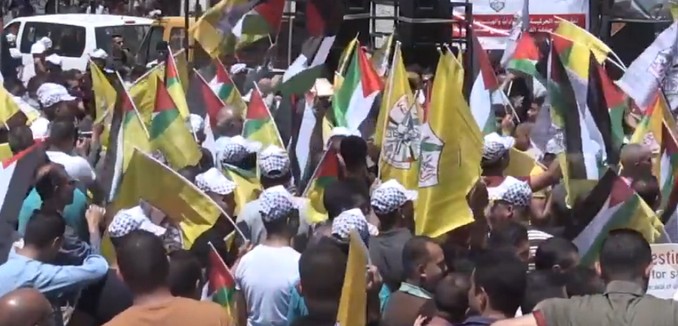The Palestinian Authority authorized West Bank activists to organize protests of the yet to be released Middle East peace plan being formulated by the United States government, The Jerusalem Post reported Sunday.
The decision to authorize the demonstrations against the nascent peace plan, and even before it is released to the public, comes in the wake of a Middle East trip by the Trump administration’s two top peace envoys, senior advisor Jared Kushner, who is also Trump’s son-in-law, and Jason Greenblatt, the administration’s Special Representative for International Negotiations. The envoys met with Israeli and Arab leaders in an effort to finish the final details of their plan. The PA boycotted any meetings with the two.
Trump has heralded his peace plan as “the deal of the century,” while PA President Mahmoud Abbas derided it as the “slap of the century.”
“We believe that the countdown for publicly announcing the Trump plan has begun,” a senior PA official told the Post. “This is why we have decided to act quickly in order to thwart this evil plan, which is aimed at liquidating our national rights and the entire Palestinian cause.”
A group that calls itself The National and Islamic Forces encouraged Palestinians to gather in the center of Ramallah to protest the U.S. peace plan and express support for the PA.
A spokesman for the group said, “We are planning to expand our activity to as many places as possible in the West Bank, Gaza Strip and our lands that were occupied in 1948,” a reference for Israel. He said that the group’s goal was to build support not just among Palestinians, but across the Arab world.
The Fatah party, which is headed by Abbas, supported the demonstrations and called on Palestinians to protest against the “big US conspiracy.”
The goals of the protests, according to a Ramallah-based analyst, are to demonstrate Palestinian opposition to the Trump peace plan and to show support for Abbas. The latter is important because the PA leader has been criticized for imposing a blockade on Gaza.
The PA has, in recent weeks, broken up demonstrations across the West Bank protesting the punitive measures Abbas has taken against the Hamas-ruled territory.
The PA and Abbas have previously defied other efforts of the administration to facilitate peace with Israel.
In two meetings with Abbas last year, President Donald Trump expressed his opposition to the PA’s paying jailed terrorists and the families of dead terrorists stipends. In late May of last year, Trump told Abbas as the two met in Bethlehem, “Peace can never take root in an environment where violence is tolerated, funded and even rewarded.” Earlier when the two met in Washington D.C., Trump said that “no lasting peace” can be achieved between Israel and the Palestinians “unless the Palestinian leaders speak in a unified voice against incitement to violence.”
However, after meeting with U.S. officials in June of last year, Abbas refused their request to stop paying generous salaries to terrorists. A month earlier, an adviser to Abbas called the U.S. request to end payments to terrorists “insane.”
The administration has criticized Abbas and the PA for blocking peace efforts. In December of last year, a White House official charged that Abbas’s rhetoric “has prevented peace for years.” Last month, Kushner, in an interview with a Palestinian paper asked whether Abbas “has the ability to, or is willing to, lean into finishing a deal.”
[Photo: WINVideoVines / YouTube ]




